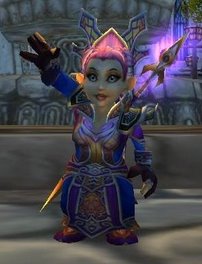But the theme that really interests me the most in Deathly Hallows is the blatant Christian imagery, particularly at the ending. I've had little patience throughout the series for those who say it's "Satanic" or try to get it banned because of the elements of witchcraft in the novels. The themes of love and sacrifice have always been key to understanding Harry Potter, and although these are not themes exclusive to Christianity, they certainly can be read along with it, rather than against it.
But Deathly Hallows takes the Christian elements to a whole new level. In Chapter 16, where Harry visits his parents' grave, the inscription on their tombstone is "The last enemy that shall be destroyed is death," which is a quote from 1 Corinthians 15:26. And then, of course, chapter 35, which is entitled "King's Cross," essentially describes Harry's death and resurrection. Harry as a Christ figure who willingly and selflessly gives his life to save his friends is accompanied by Dumbledore as a sort of "God the Father." The added complexity of Dumbledore in Deathly Hallows makes thinking of him as the Father particularly interesting, since he is no longer the omnipotent, unquestionably good headmaster that we've known from the first 6 books of the series.
What interests me the most about this is that no one seems to really be talking about these themes. Reviews I've read talk about parental love, friendship, and how everything gets wrapped up nicely, but very few seem to bring up the Christian elements or the complex way in which they're developed. Newsweek had a brief blurb about it, but it in no way addressed the theme in any depth. It seems to me that this is a theme with a lot of potential, and I really hope that scholarship on Deathly Hallows in the future takes advantage of this.

1 comment:
did you see the blogged discussion between o.s. card and p. rotfuss? i didn't read the whole thing, but "harry potter as a christ figure" is mentioned quite a lot, i believe.
Post a Comment